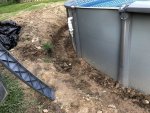To bond a resin above ground pool, you will need to install the proper grounding equipment first. This includes an 8-foot copper grounding rod and a bonded steel cable that connects the bonding lug of the pool wall to it. After this is done, run #8 AWG solid copper wire from the bonding lug on the pool wall around all metal components within 5 feet of the pool edge and connect it back to itself at one point near where it begins.
Use PVC conduit or other approved protection for any exposed wiring and make sure all connections are secured with electrical tape or appropriate junction boxes. Finally, ensure that your local codes have been met before using your new above ground pool!
Setting up an above ground pool is a great way to enjoy the outdoors and beat the summer heat. However, if you are considering installing a resin above ground pool, bonding it properly is essential for safety. Bonding your resin pool involves connecting all exposed metal components of the pool together with copper wire to create an electrical bond that will reduce potential shocks in and around the water.
This process can be complicated so it’s important to consult with a professional electrician or swimming pool technician before attempting this task yourself.

Credit: www.troublefreepool.com
How Do I Bond My above Ground Pool?
Bonding your above ground pool is an important safety precaution to take. It helps protect everyone in the area from electrical shocks. Here are the steps for bonding an above ground pool:
– Turn off power supply to the pool.
– Ground the metal components of your pool, such as ladders or handrails.
– Connect a copper wire from these grounded parts directly to a grounding rod driven into the earth near your pool.
– Install a GFCI (ground fault circuit interrupter) outlet and plug it into a properly grounded receptacle that’s connected to your home’s electrical service panel via wiring that meets local codes and standards.
Finally, check with local building officials to ensure you’ve met all requirements for safely bonding an above ground swimming pool.
Should above Ground Pool Be Bonded?
Yes, above ground pools should be bonded. This is necessary to protect swimmers from electric shock due to any damage that occurs in the pool’s electrical wiring. Bonding an above ground pool includes:
• Installing a bonding wire between the metal components of the pool and its equipment
• Connecting this wire to a grounding rod driven into the earth near the pool
• Connecting all metal components in or around the pool with copper wires.
Properly bonding your above ground swimming pool ensures everyone’s safety and peace of mind.
Does a Plastic Pool Need to Be Bonded?
Yes, a plastic pool must be bonded. Bonding protects the pool and its users from electric shock if there is an electrical fault in or near the water. Here are three reasons why a plastic pool should be properly bonded:
* It helps reduce potential electrocution hazards
* It helps protect against corrosion of metallic components near the pool
* It reduces damage to pumps, filters and other equipment due to electrical faults.
Therefore, bonding a plastic pool is essential for safety and protection of people using it as well as protecting the equipment associated with it.
What Happens If Pool is Not Bonded?
If a pool is not bonded, it poses a safety hazard. Bonding helps to protect people from electrical shock by providing an alternative path for electricity to follow if the wiring becomes faulty:
– Ground fault circuit interrupters (GFCIs) will not work properly and may be unable to detect any problems.
– Potential water damage or injury due to electric shock can occur in these situations.
– The pool’s metal components, such as ladders and handrails, can become energized with electricity which could cause serious harm when touched.
In summary, bonding your swimming pool is essential to ensure the safety of anyone using it.
Bonding an above ground swimming pool
Conclusion
This blog post has provided an in-depth look at the process of bonding a resin above ground pool. From determining the size and location of your pool to selecting the correct components for proper bonding, this post has given readers all the necessary information needed to properly bond their own resin above ground pools. With these steps followed correctly, you can be sure that your pool is safe and secure for swimming.

